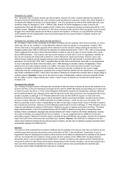Paragraph one, Angola.
Yes - during the crisis in Angola, detente was still consistent, however the crisis in Angola reflected how despite how
strong the US-Soviet relationship was, both countries would still always be suspicious of each other which therefore is
not aligned with detente as tension is not being relaxed. - the US’s perspective as well as their relationship with Cuba
(evidence Treaty of Friendship in 1976.) - William Colby, Director of Central Intelligence in reply to why the US
supported the FNLA with $25 million supplies and $13 million arms “because the Soviets are backing the MPLA, is the
simplest answer.” However, in the Summer of 1975 when it became evident that the FNLA was going to lose the power
struggle, they intentionally abandoned the FNLA to prevent the repetition of Vietnam occuring (therefore preventing
conflict between the two superpowers) which shows that Angola did not cause the failure of detente, however did
contribute to its failure.
Paragraph two, the failure of the Vienna Summit and SALT II.
No - the failure of SALT II also contributed to the failure of detente and the outbreak of the second Cold War, as Jimmy
Carter was seen as too ‘ambitious’ in which Brezhnev believed made him appear as uncooperative. In March 1977,
Jimmy Carter sent a very specific proposal which outlined his and his advisors' needs including the reduction of the
strategic systems (from 2400 to 1800) and the reduction of missile launchers (from 1320 to 1100.) Also in this proposal,
Carter suggested the banning of intercontinental ballistic missiles as well as all types of cruise missiles with a range
above 2500 kilometres. - This however was seen poorly however as Carter left no room for negotiations, similarly, he
also did not recognise the Vladivostok Conference in which Brezchnev argued was binding. However, prior to the
Vienna Summit, detente was still arguably strong as both superpowers were still devoted to proceed with the SALT
agreement. On the 9th May 1979, SALT II arguably failed as both Carter and Brezchev had made no real agreements
on how to decrease the threat of the Arms Race, and in 1980 following the Soviets invasion of Afghanistan, Carter
withdrew from the treaty therefore making it not ratified. The failure of the Vienna Summit and SALT II did heavily
contribute to the failure of detente and the outbreak of the Second Cold War, as Brezhnev and Carter’s fragile
relationship and their unwillingness to cooperate only increased tensions between the two superpowers, and arguably it
was Carter’s withdrawal of SALT II which led to the failure of detente as it showed the countries were no longer willing to
maintain detente. Arguably if it was not for the Soviet’s invasion of Afghanistan, detente could have expanded further
into the 1980s, however maybe detente gave Carter a reason to give up detente as it showed the Soviets had not
changed at all.
Paragraph three, Ethiopia
Yes - Similarly to Angola, events in Ethiopia also contributed to both the failure of detente as well as the outbreak of the
second Cold War, as the US intentionally increased tension with the USSR after falsely accusing Moscow of using Cuba
to extend its power into Africa. In 1974, Colonel Mengistu Haile Mariam asserted his dictatorship in Ethiopia, although
the US believed Mariam was a Marxist-Lenist, after the fall of the Soviet Union it became more transparent that he was
actually a socialist, as although in 1977 Mariam asked both Cuba and the USSR for support, he was much more
focused on Cuba due to its foreign policy in which promised to assist in any social revolution, as well as due to Cuba’s
success in Angola. Although, the USSR supported the socialist revolution - which we know as in November 1977
Breznev personally wrote to Castro congratulating him after he had begun to place Cuban troops in Ethiopia to assist in
the revolutionary movement - Breznev nor the USSR personally became involved in Ethiopia. In 1978, President Jimmy
Carter accused Moscow of placing 15,000 troops in Ethiopia as a pawn to expand communism into Africa. This action
highly harmed detente, as the US increased tension with the USSR for falsely accusing them of expanding power,
similarly Carter’s presidential campaign had promised detente with Cuba to heal the US-Cuban relationship, however
the events in Ethiopia only weakened both forms of detente. - It can be suggested that the USSR did not become
personally involved in Ethiopia for several reasons including the fact that Ethiopia was socialist, however the most likely
reason the USSR never intervened was most likely due to detente. However, the USSR did not retaliate to the US’s
claims which therefore showed that they still had hope for detente, and this lack of retaliation arguably prevented direct
confrontation between the USSR and US.
Hypnosis
The events in Africa contributed to the failure of detente and the outbreak of the Second Cold War, but however did not
primarily cause them because other factors such as the failure of SALT II also contributed. Furthermore, it can be
argued that it was not necessarily the events in Africa which led to the failure of detente and the outbreak of the second
cold war, but instead the US’s reaction to those events and their suspicion of the USSR which increased tensions.
During this period, it can be agreed that the USSR tried to maintain consistency with detente as they intentionally did
not become involved in either Africa north America despite being of their interest. Similarly, it can be also argued that it
was Cuba which created the breakdown of relations as Castro’s actions were unpredictable and resemble early
communism which made it believable that Cuba was a ‘surrogate.’




